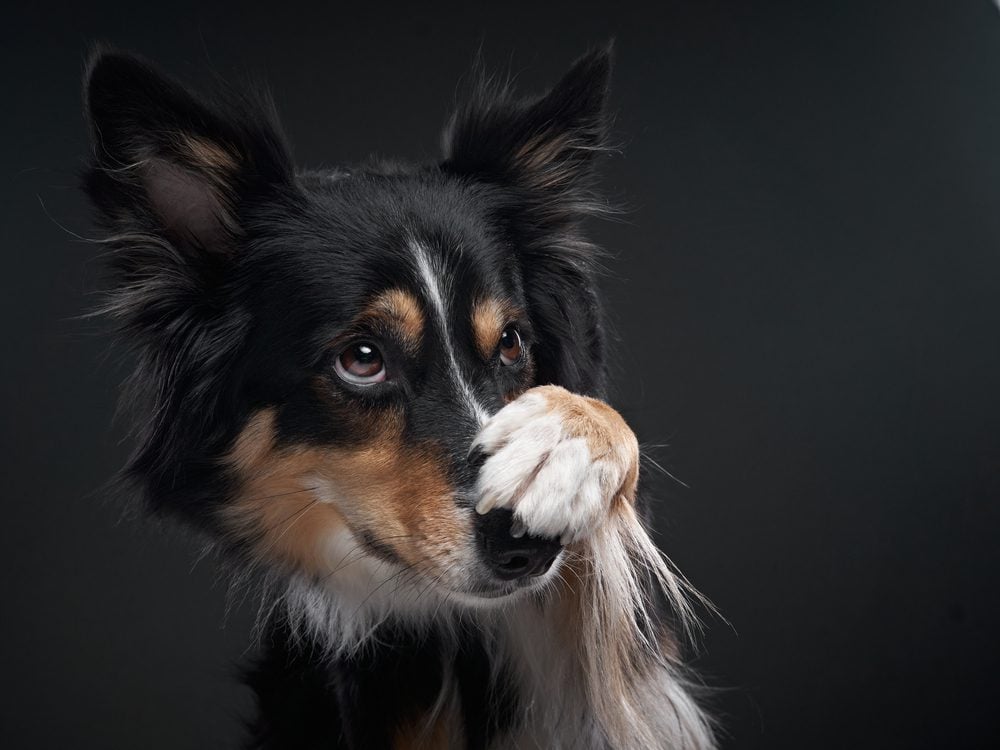Autism spectrum disorder (ASD) is an invisible disorder that affects around 1% of the population. It is often characterized by difficulties with social communication and is usually diagnosed during early childhood.
Because those with autism struggle to communicate in the same way as others, they are often misunderstood. This can lead to difficulties in forming meaningful relationships, which may cause feelings of loneliness or inadequacy.
Therefore, many people get dogs for themselves or for their child struggling with ASD, because dogs are not judgmental and offer unconditional love. A dog will not view someone’s ASD as strange or confusing; instead, dogs will adapt to the type of communication they receive.
Though getting a dog can be a fantastic way for those with autism to find unwavering friendship and combat feelings of loneliness, it’s important that people choose a dog that is right for their lifestyle. While any dog (even a mutt) could be a fantastic companion to someone with autism, we find that some breeds are more suitable than others.
In this article, we will go over which dog breeds should be avoided by people with autism and why these breeds aren’t always a great option. Then, we will offer seven alternative breeds that we think could be an excellent choice for those with ASD.
Aggressive Breeds
Most dog breeds are not intrinsically aggressive. After all, humans bred them, and we would not want to have pets or working animals with aggression. However, some breeds are still more prone to biting than others.
Many of these breeds are small breeds, likely because aggression in smaller animals isn’t taken as seriously, as their bites aren’t likely to cause major injuries. However, even a small breed’s bite can hurt and could be especially dangerous to children.
According to a study published in Applied Animal Behavior Science, some breeds are more likely than others to bite or attempt to bite.
These are the breeds listed as most likely to bite, which we think people with ASD should avoid:
- Dachshund
- Chihuahua
- Jack Russell terrier
- American cocker spaniel
- Beagle
- Australian cattle dog
Some breeds were also found to be aggressive toward other dogs. Being responsible and having control over your dog can prevent incidents, but it is often not worth the headache for many people (whether on the ASD spectrum or not). Here are the breeds the study listed as most aggressive toward other dogs:
- Akita
- Jack Russell terrier
- Pit bull terrier
Breeds That Bark a Lot
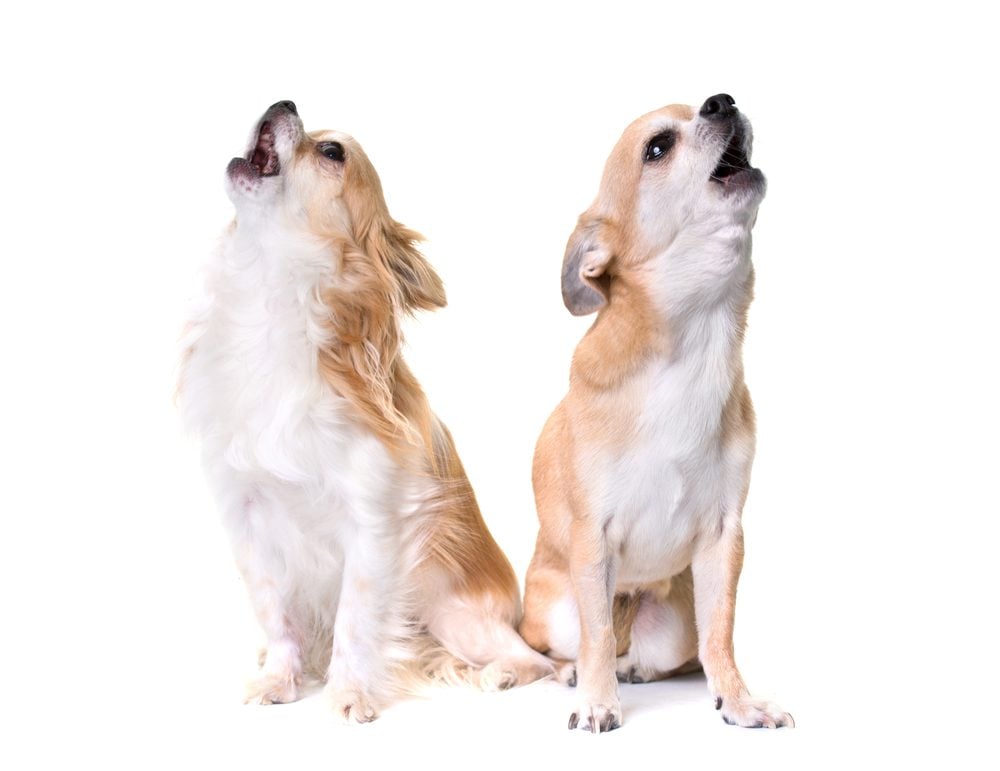


Some people with autism may struggle with sound sensitivity. While dogs can be lovely companions, it is in their nature to bark. Of course, some breeds tend to be yappers, and others that are naturally quieter.
For those that do have sound sensitivity, it may be best to avoid the yappers. Here are some breeds that are known for being vocal:
- Chihuahua
- Beagle
- Pomeranian
- Miniature pinscher
- Dachshund
- Yorkshire terrier
- Siberian husky
- Miniature schnauzer
- Cairn terrier
- West highland white terrier
High-Energy Breeds
Though many high-energy breeds are incredibly smart and have great personalities, their mental and physical needs are often more than what the average owner can provide. This is especially true if you work a traditional 40-hour-per-week job.
If the dog is meant to be for a child, you cannot reasonably expect them to take over all the responsibilities of the dog’s needs. Of course, many children, from toddlers to teenagers, will promise over and over to care for an animal because they want one so badly, but parents should always be ready to pick up the slack.
This can sometimes be difficult with high-energy breeds because they need so much more exercise and attention than other dogs. Here is a list of high-energy breeds whose exercise and mental enrichment requirements are demanding:
- Siberian husky
- Border collie
- Viszla
- Poodle (standard)
- Australian shepherd
- German shepherd
- German wirehaired pointer
- Irish setter
- Weimaraner
- Jack Russel terrier
- Australian cattle dog
The Best Dog Breeds for Autism
Now that we’ve talked about some of the breeds that you may be better off avoiding, let’s talk about the breeds that are a good fit for those on the autism spectrum.
Labrador Retriever
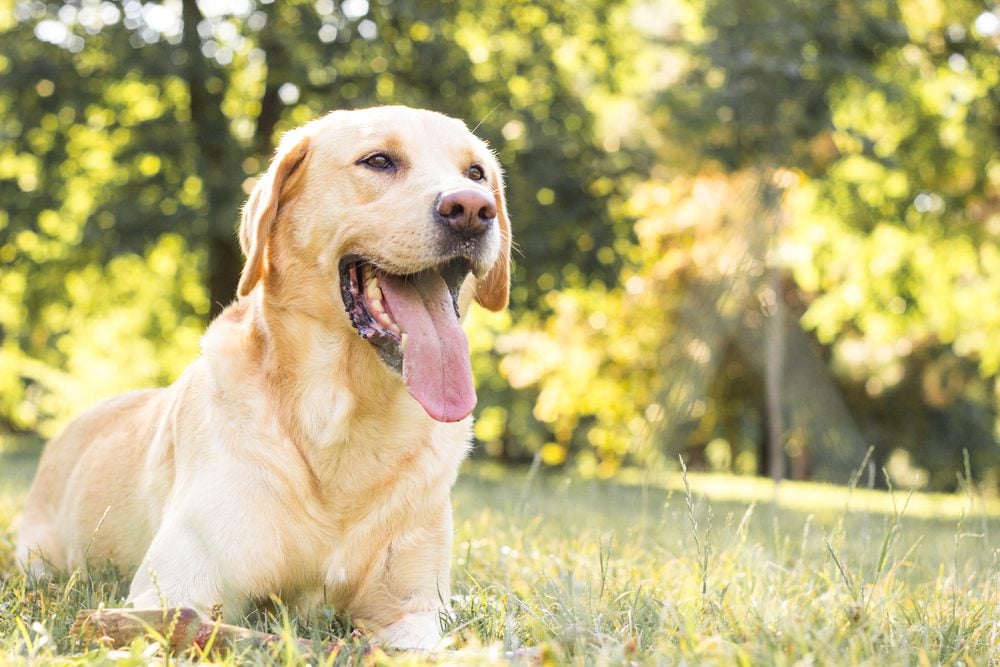


Labrador retrievers have been the number one breed on the AKC’s Most Popular Breeds list since 2013 (and we wouldn’t be surprised if they came in first in previous years — we just don’t have that data!). This is likely because of their superb nature.
The Labrador retriever is a versatile breed that can hunt, work as a service dog, and be a wonderful companion. They are naturally loyal, friendly, and outgoing. Additionally, they’re quite playful and love nothing more than a game of fetch.
Labradors are also easy to train and tend to be quite obedient because they are very people-oriented. They are patient and tolerant of children and can certainly keep up with their energy. This breed can also participate in many family activities, such as swimming and hiking. They don’t require much grooming, but brushing them during the shedding season can help reduce hair in your home.
All of these qualities make Labradors a solid choice of dog for anyone with ASD. Labs do have a fair amount of energy, especially during their youth, but they don’t tend to be as difficult to manage as breeds like the border collie or German shepherd. They should be walked daily, but they’ll also love getting their exercise through a game of fetch.
Golden Retriever
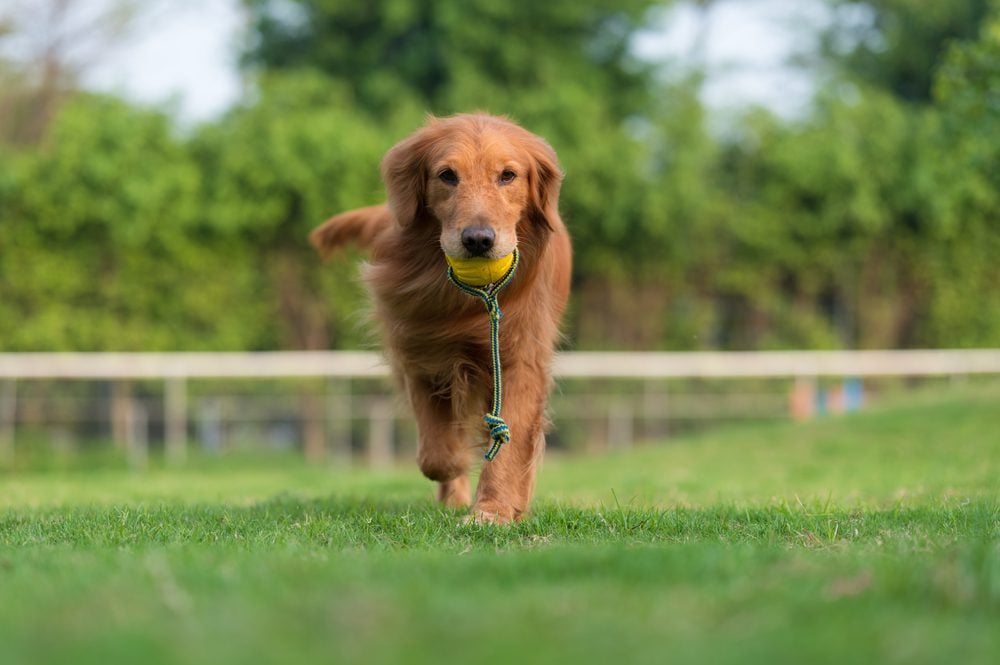


The golden retriever is another fetch-loving breed that is versatile in all the same ways as the Labrador. This breed, too, is outgoing, friendly, and happy-go-lucky. Golden retrievers are well-known for being fantastic family dogs.
They’re people-oriented and easy to train, which often results in an obedient dog. They are also great with children and will enjoy joining the family to swim or hike. This breed is much like the Labrador retriever but may be better for those who want a dog with slightly less energy.
The golden retriever is also less likely to bark than the Labrador. In fact, the AKC lists them as barking “only to alert.” This would make them a suitable breed for people on the ASD spectrum who have sound sensitivities.
If you’re looking for a large breed that is friendly, good with kids, and has enough energy to keep up with family activities but isn’t hyper, then the golden retriever may be a perfect choice. Just keep in mind that they need to be brushed once per week to keep their long fur from tangling.
Bernese Mountain Dog
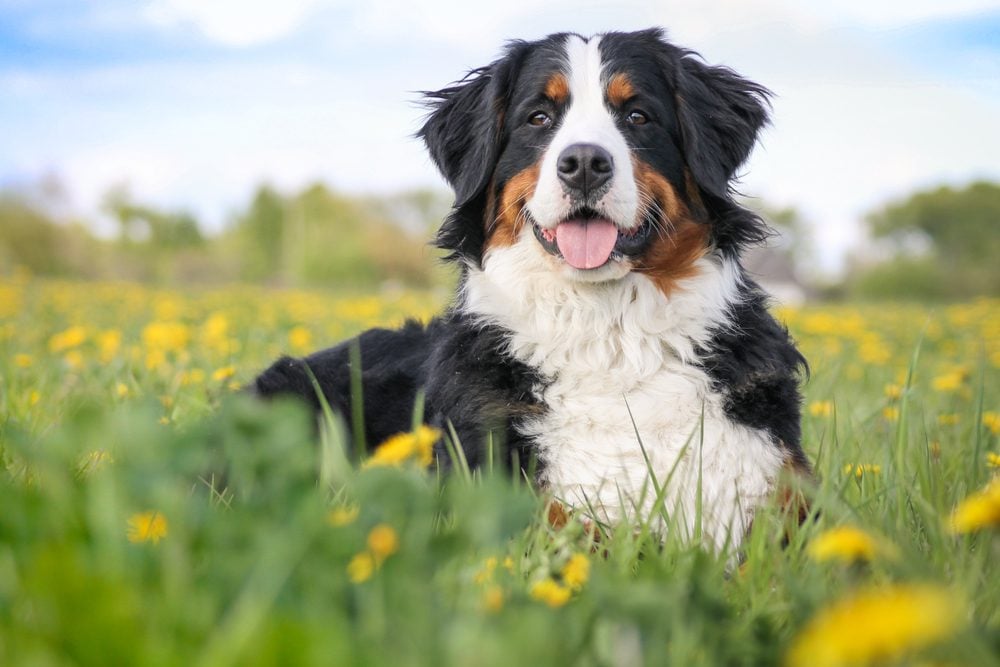


Compared to retrievers, the Bernese mountain dog (affectionately called Berner) is not as well-known. However, this breed, too, makes both a stellar service dog and a loving family companion. They are sure to be a great friend to someone with ASD!
The Bernese mountain dog is often described as calm, placid, and gentle. They tend to be very sweet and affectionate toward their owners but also have a playful side. They seem to be aware that children are smaller than them and are known to be gentle with young ones. They also get along well with other dogs and are friendly toward strangers.
Berners are quite intelligent and are eager to please their people, but they’re also sensitive and should only be trained with positive reinforcement (all breeds should be!).
Though the breed isn’t a constant barker, they aren’t considered quiet either. They may bark at animals or people they can see out the window and thus wouldn’t be the best option for someone with sound sensitivities. They also shed a ton and should be brushed daily during shedding season (but otherwise, weekly is enough).
Newfoundland
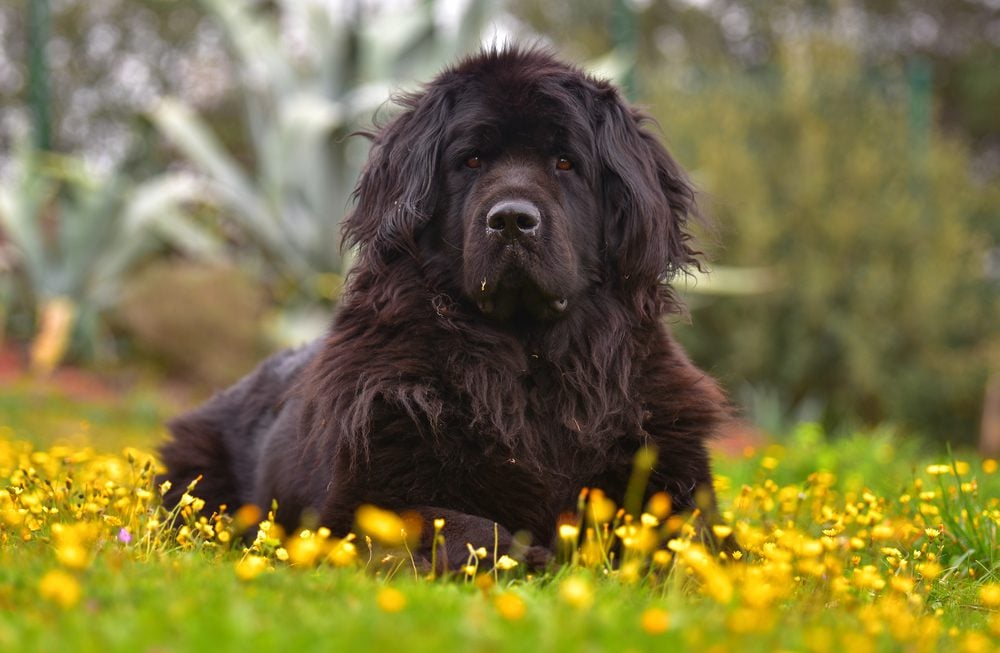


The Newfoundland—often called “Newfie”—is another large fluffy breed with a stellar personality. Perhaps large is an understatement, as these dogs can weigh up to 150 pounds, which makes them the biggest on our list!
Their size is not a problem considering how gentle they are toward everyone (including kids), but it may become a problem when they get old and need help getting into the car or bathtub. So if you have any mobility issues, the Newfie’s largeness is definitely something to consider.
Otherwise, the Newfie is a sweet, devoted companion that is so patient as to have earned the reputation of being a “nanny dog” for children. Of course, children and dogs should always be supervised, but Newfies are likely a safe option for families with kids.
This breed is eager to please and very trainable but not quite as open to training as some other breeds on the list. As long as you use positive reinforcement and are patient and consistent, the Newfie can be just as obedient as any other dog.
Newfoundlands are fantastic watchdogs, and their size will certainly scare away any would-be intruders. Despite this, they are not barkers and only bark to alert, making them a good option for people with sound sensitivities.
Newfoundlands also have only an average amount of energy, but it’s enough to keep up with their families. They love to swim and hike and enjoy being outdoors with their people. As for grooming, they need only be brushed once per week except during shedding season when daily brushing becomes a necessity.
Cavalier King Charles Spaniel
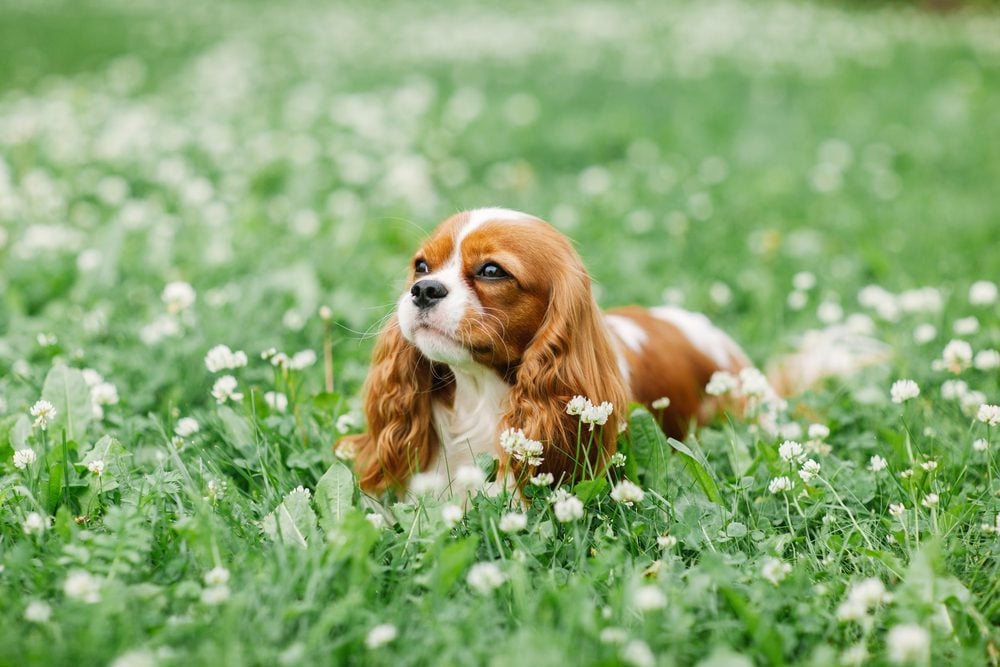


Big dogs are often recommended for families with young children because they are not easily hurt or bothered. However, if you are looking for a small dog, we’d recommend the Cavalier King Charles spaniel.
Not only are King Charles spaniels beyond adorable, but they have lovely dispositions. They’re affectionate, good with children, good with other dogs, and friendly toward strangers. What we especially love about cavaliers is how adaptable they are.
Are you a couch potato? The cavalier King Charles spaniel would love to join you. Live a more active lifestyle? This small breed is surprisingly athletic and will happily keep up!
Cavalier King Charles spaniels are also quite intelligent and easy to train as they are eager to please their owners. Despite their long coats, they are not a high-maintenance breed and only need to be brushed once or twice per week.
While not a yapper, the cavalier King Charles spaniel is also not known as a silent breed. They are absolutely fantastic companions who can offer a lot of love and friendship to someone with ASD, but they may bark too much for those who have sound sensitivities.
Bichon Frise
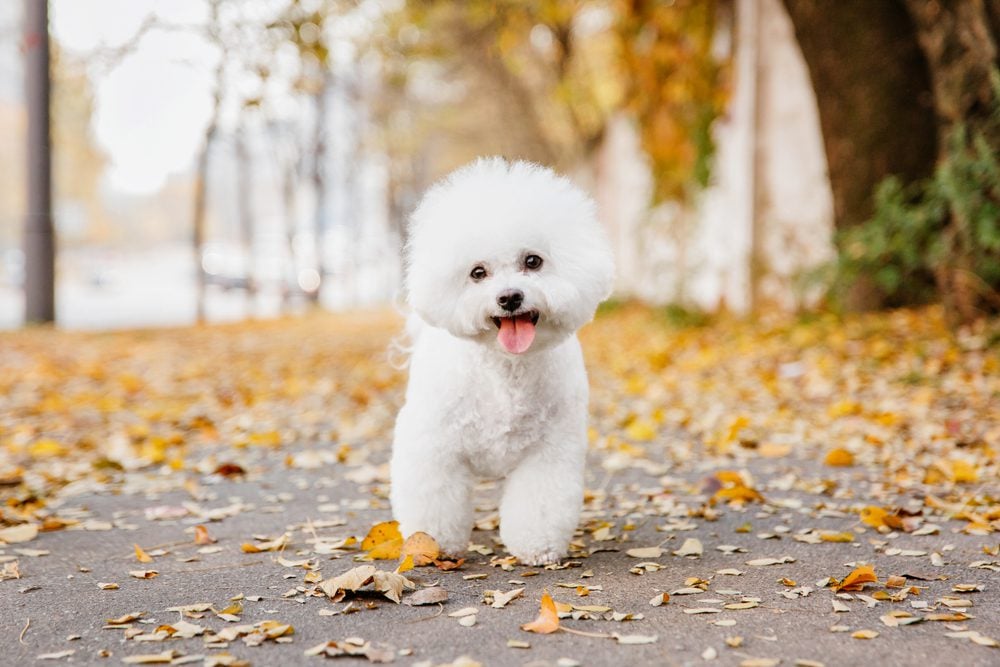


The bichon frise is worth considering if you want a small dog with a “hypoallergenic” coat. While no dog is truly hypoallergenic, the bichon frise is incredibly low-shedding and is one of the least likely breeds to irritate allergies.
A coat like this comes with a cost—they will need to be trimmed every four to six weeks, or you’ll be spending time managing their coat every day. However, once trimmed, you’ll only have to brush them about once per week.
But enough about the coat, what is this breed like? The bichon frise is curious, playful, and happy-go-lucky. They are sure to bring a smile to your face. They adore their families, are good with children and other dogs, and don’t know the definition of “stranger.”
Due to their small size, handling the bichon’s energy level is quite manageable. One walk per day is often enough, but remember that this breed lives for a good play session. They need regular play daily to prevent boredom and strengthen the bond between dog and owner.
Though the bichon would make for a fun and loving companion for anyone with ASD, it should be known that they are moderate barkers—they are neither loud nor quiet. Unfortunately, this barking level may still be too much for those with sound sensitivities.
Toy Poodle
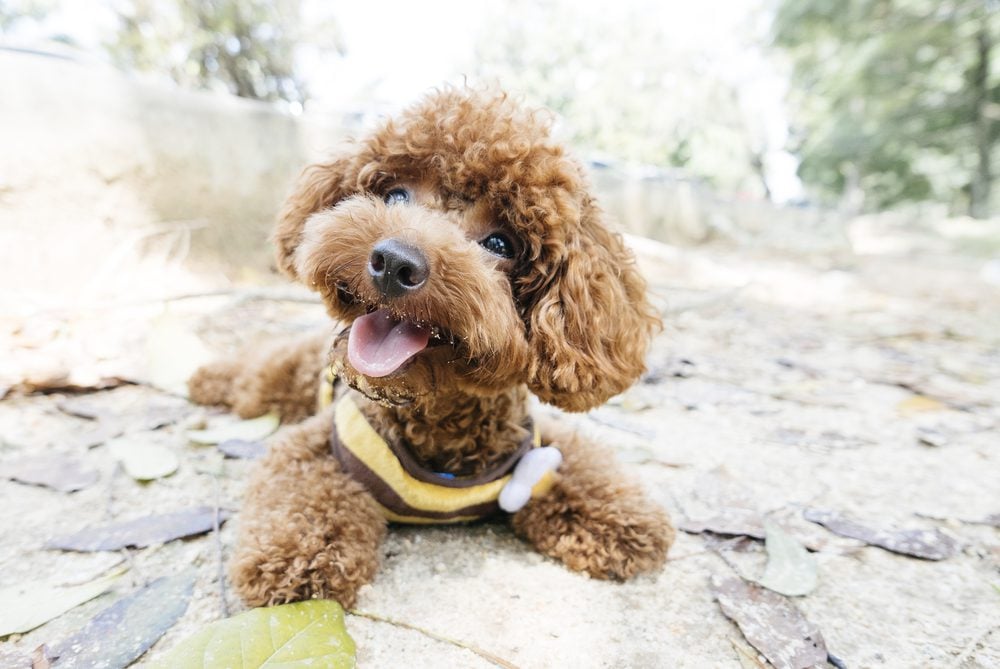


Standard poodles are big dogs with big energy, which is why they may not be a great choice for everyone, but toy poodles are more manageable due to their size. Still, be aware that this breed, no matter the size, is athletic and energetic.
Toy poodles need about 30 to 45 minutes of exercise per day minimum. If possible, spend time both walking and playing with them every day. Many poodles love to play fetch.
If you can keep up with the toy poodle’s exercise needs, then they can be a fantastic companion for people with ASD. They’re very affectionate and friendly and do well with children and strangers. They get along with other dogs as well.
Toy poodles are easy to train because they are incredibly smart and eager to please. This, coupled with their athleticism, means they can excel at canine sports such as agility, obedience, and tracking. They are also good swimmers. Despite their small size, toy poodles can participate in many different activities, making them the perfect friend to someone with ASD.
Another great thing about this breed is that their coat is hypoallergenic. Like most hypoallergenic breeds, this means the coat requires extra care. Most owners have their coats clipped every four to six weeks, so they do not have to brush their dogs every day.
Though the toy poodle has a lovely personality and is athletic enough to do all sorts of fun activities with their families, they do have a propensity to bark, making them unsuitable for someone with sound sensitivities.
The Best Breed Is the One That’s Right for You!
We’ve explained why certain breeds are the worst options for people with autism as well as why others are the best. However, every person (and every dog) is different. So for someone with ASD, a dog on our worst list may be the best possible choice.
It all comes down to one’s personal preferences and needs. We’ve provided a lot of detail about the breeds we love for those with autism, but it is up to you to do in-depth research about any breed you’re interested in. If you’ve always wanted one of the breeds on our no-go list, find out more about them and see if you think the breed could actually fit your lifestyle.
At the end of the day, the best dog for someone with autism has nothing to do with the dog’s breed and much more to do with the dog’s personality and behavior. The right dog is the one that fits into your lifestyle and provides you or your child with unconditional love and unwavering friendship.
